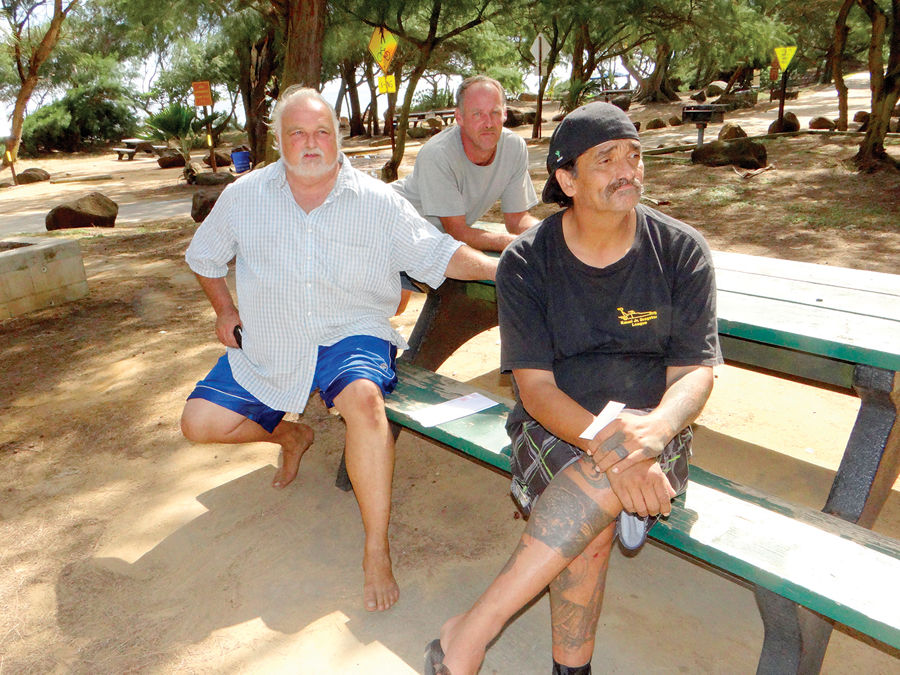LIHUE — Several homeless people are accusing county enforcement of targeting them at a public park. “We have just been treated real disrespectfully,” said Robert Diaz. “I am not asking for special privileges. I just want to be treated equally and don’t
LIHUE — Several homeless people are accusing county enforcement of targeting them at a public park.
“We have just been treated real disrespectfully,” said Robert Diaz. “I am not asking for special privileges. I just want to be treated equally and don’t single me out.”
Diaz said his homelessness has lasted two months as he waits for a disability rating. His spouse and two adult children also stay with him using camping permits at Lydgate Park.
Diaz claims he is harassed for minor infractions or when he hasn’t done anything wrong. He said his daughter was filling a container from the same outdoor tap that people use to wash themselves and their vehicles when she was threatened with a fine for stealing county water.
Another time he was awaken at 4:30 a.m. and told his tent was four inches over the 10’ x 10’ boundary line.
According to County Parks and Recreation department, applicant permits acknowledge the terms and requirements to include vacating campsites at the expiration. Failing to abide by the terms may result in the party and property being forcibly removed from the campsite.
County security officers are trained to respect park users, to provide assistance, information and avoid confrontation. Enforcement problems are to be referred to Kauai Police Department.
“Our rangers are trained to enforce the rules, but not be heavy handed about it,” said County Parks & Recreation Director Lenny Rapozo, encouraging anyone with concerns about a specific situation to contact his office.
The rules say that people without valid camping permits are not allowed in the campground between the hours of 9 p.m. and 6 a.m. The exception is the fishing access road that runs under Kamalani Bridge, which is kept open at all times along with a portion of the coastal path that runs through the campground and the small rest pavilion.
The difference in enforcement, he said, is that someone found reading a book in the campground area while it’s closed is asked to relocate to the rest pavilion. A group found drinking during the closure is just asked to leave.
Other homeless are saying park enforcement is not consistent with explanations. They claim to hear one thing from one officer and something different from another.
“There is nothing going on that keeps anyone else from enjoying the same area,” said David Shveyda, who came to Kauai with his spouse to work on a local organic food in exchange for work — until the farm workers were evicted for illegally residing on independent farmland.
The homeless situation has been brief and Shveyda said he expects to find another farm situation soon. In the meantime, the couple camps or stays in their minivan.
“In this short time we have felt very harassed and like our rights might have been violated,” Shveyda said.
Tony Sherrill, a disabled adult who lives out of a conversion van, pays for camping spots by daily permit to be able to park. In cold or rainy weather, he prefers to remain in his van but was ticketed twice in one week.
“The conversion van is better equipped for someone my age to sleep,” he said.
Park enforcement comes about 4:30 each morning. They tell the campers if they are awake to turn the lights on and they won’t get ticketed.
“Unfortunately, the person that picks up the camping permit doesn’t always relay this information to other campers in their group and problems sometimes arise,” Rapozo said. “Sometimes they get information from others and are not given the right information.
Rangers make it a point to inform users of the rules and if requested, will provide copies to campers. Contact John Martin, Parks Permits and Security officer regarding copies of the rules or visit kauai.gov under Parks and Recreation.


